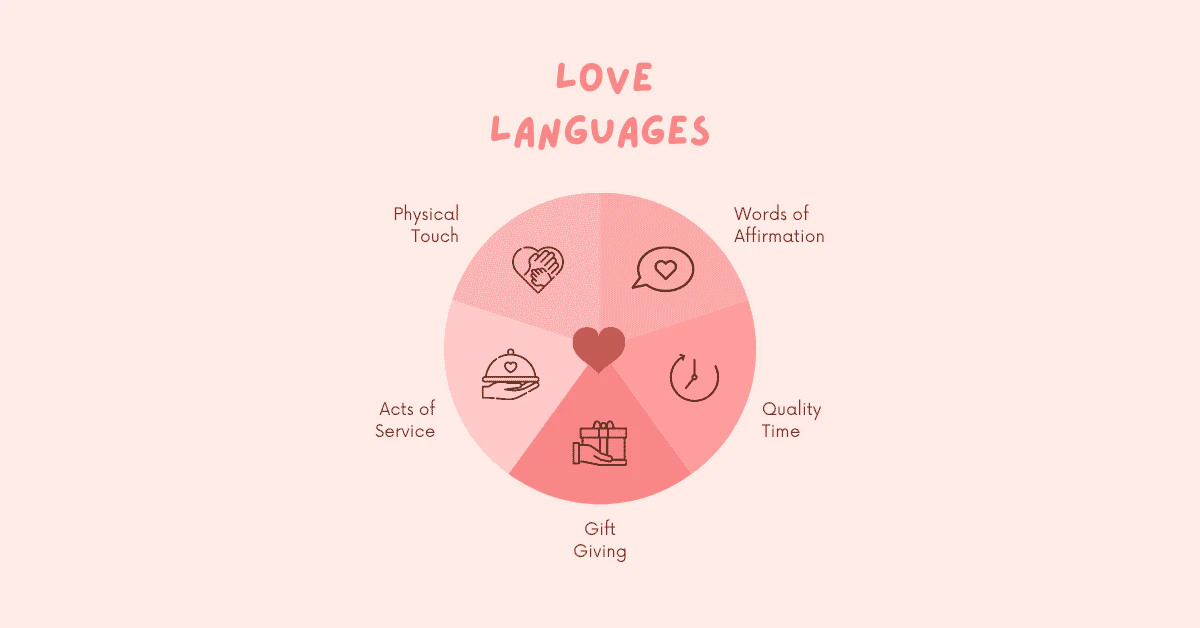Have you ever said something like, “I told you I needed space, not another gift!” or “Why won’t they just listen when I’m talking?”
If you’ve had thoughts like these in a relationship—romantic, familial, platonic—it might not be a misunderstanding. It might just be a mismatch in love languages.
And here’s the best part—you can figure yours out easily with a love languages test. No therapy needed (though that’s cool too). Just a few minutes of honest reflection.
Let me tell you how it works and why understanding this has helped millions of people finally feel seen for the first time in relationships.
Why Your Heart Isn’t Getting Fed
I’ll level with you—it’s frustrating. You do what feels right. You say what feels important. But your partner (or parent, or kid, or coworker) just doesn’t seem to get it.
Maybe you leave sweet notes everywhere but they always forget to read them. Or you cook dinner every night hoping it shows love—but they talk over you while planning their weekend.
This isn’t because anyone is trying to hurt anyone else. This is just the reality of having different love languages. And you’re not alone.
Your Emotions Aren’t Wrong—They’re Trying to Speak
Your heart is speaking a language—but the other person might only hear English when you’re saying, “I need hugs.”
So yeah, it hurts when it seems like nothing lands. But once we start recognizing how differently we give and receive love, things change. Fast.
There are 5 love languages, according to Dr. Gary Chapman, who’s been helping people understand these dynamics since the early ’90s. People aren’t mixed signals—we’re just different styles of giving.
Understanding the 5 Official Love Languages

Before diving into any tests, here’s the lowdown on the 5 most common types. Chances are, you already align with at least one intuitively:
- Words of Affirmation – Hearing praise, appreciation, or encouragement fills you up.
- Acts of Service – When someone takes care of tasks for you, that shows love.
- Receiving Gifts – Not about materialism; thoughtful presents mean you’re cared for.
- Quality Time – Sitting across from someone and focusing entirely? That’s your thing.
- Physical Touch – Hugs, cuddles, holding hands—physical contact deeply matters to you.
Sometimes people hear “7 love languages” or versions with tweaks like “digital” or “texting.” Those exist—but stick with the core five from Dr. Chapman for clarity.
You’ve probably guessed your top one by now. But proving it? That’s where a good test comes in.
How to Take the Best Love Languages Test
Alright, so where do you actually take the test? Good news: there are free ones that work. Like, legitimately free. No credit card required.
The official quiz offers reliable results based on decades of psychological insight and feedback from couples all over the world.
Or, if you want something a little more detailed, there are adaptations like the My Love Language Test, which updates some questions for modern lifestyles while keeping things grounded in science.
Whatever route you take, make sure you’re in a quiet environment. Be honest. And don’t try to game the system—these quizzes aren’t about winning; they’re about connecting.
What One Reader Learned About Her Marriage
Let me tell you about Jake and Emily (okay, not their real names—but kind of close).
They got married fast. Were super compatible on paper. Lived happily-ish ever after—till they hit communication roadblocks. He’d do nice things. She kept asking for time together. He kept feeling unappreciated. Things started blowing up weekly—until they stumbled upon love languages.
Jake’s score said his main language was Acts of Service. Emily scored high in Quality Time. She thought acts of service were sweet—but they left her feeling “seen” for maybe an hour before wondering, again, why he couldn’t sit with her quietly afterward.
Once they spoke each other’s languages…
…Jake still made dinners and did chores—but he also carved out date nights. Emily still loved hanging out—but now gave him props for cleaning the gutters. No more resentment. Just recognition.
Who Should Take This Test—and When
You. You need to take it. Even if you don’t think “love languages” is your jam. Here’s why:
- Need better bonding with your significant other? ✔️
- Wondering how to express gratitude to your friends or coworkers? ✔️
- Frustrated that your kids “won’t listen” when you’re doing everything right? ✔️
- Trying to gain emotional clarity in any relationship situation? ✔️
Dating someone new? Already long married? Heading to a family gathering? Whatever stage you’re at, aligning with someone’s love language helps eliminate signal interference—so love actually lands.
Benefits of Discovering Your Language
Taking a test won’t fix everything. But hearing those words aloud can shift something powerful.
A recent study referenced on lovelanguage.co showed that 92% of respondents said the insights from their test made a visible improvement in their personal relationships. Yes, really.
We see changes like:
- Fewer fights about who contributes more
- Higher levels of intimacy—emotional and physical
- Better teamwork in households and workplaces
- Less emotional fatigue from miscommunication
This makes sense when you stop and think—it’s much easier to love someone the way they need when you know what that way is.
Potential Pitfalls (And How to Avoid Them)
Like anything useful, people can misuse it. So let’s cover what the test isn’t too, just in case:
- It’s not a compatibility calculator. Just because yours is Physical Touch and theirs is Words doesn’t spell doom—you can meet halfway.
- People are not puzzles made of a single color. You might share two, three, or even all five languages to varying degrees.
- Fluctuations are normal. Kids’ love languages may shift as they grow. Adults evolve too—based on experiences, trauma, happiness.
Think of it like hearing preferences—yes, you probably fall mostly into one category, but that doesn’t make the others useless. Same goes for how you connect emotionally.
Making It Work Beyond the Test
Your score was Words of Affirmation. What next?
Start practicing recognition out loud:
“You looked calm on your call today. That felt peaceful.”
Little affirmations—spoken, written, or even signed—help refill a Word-based heart.
But switching tracks isn’t instant. Give yourself time to adjust. Notice what resonates. The test gives you clues, and real-life conversations bring those clues to life.
Your Language Can Change—and That’s Okay
Yes, childhood or past relationships shape how you bond. But your preferences can shift with intention.
When someone begins healing from neglectful parenting, their love language might turn from Receiving Gifts to Acts of Service—or vice versa—as they find security again.
And that’s totally valid. Healing from pain often changes how we access joy.
Other Quizzes That Go Deeper (Optional But Cool)
Not all quizzes are created equal. If you’ve taken the basic love languages test and want deeper tools, check out:
- Apology Language™ quiz – Because apologies have multiple meanings
- Anger Assessment – Learn how you handle anger vs. how you’re triggered
- Appreciation Language™ inventory – Helpful for understanding colleagues and team members
I love digging into profiles like these, especially in newlyweds, young professionals, or HR teams looking to build stronger trust within teams.
Is There a “7th Love Language”?
Occasionally, people come across references to extra or “new” languages. Examples include:
- Digital Expressions (texts, emojis, DMs)
- Small Gestures (surprising morning coffee)
- Spontaneity (impromptu adventures)
While these might represent real ways people connect, the standardized model still uses the original five from Chapman. So don’t panic if one of those newer terms doesn’t match your profile—it’s likely your preferred option falls naturally under an existing one.
| Language | Example Behaviors | Feeling Misunderstood Could Show Up As… |
|---|---|---|
| Words of Affirmation | Giving compliments, saying “I appreciate you” | Feeling dismissed when your feelings aren’t verbalized |
| Acts of Service | Cleaning house, running errands | Feeling lonely when no help is offered |
| Receiving Gifts | Handwritten letters, sentimental tokens | Feeling taken-for-granted when memory neglects milestones |
| Quality Time | Prioritizing conversations, active listening | Feeling invisible when date nights disappear |
| Physical Touch | Hugging, sitting close, intertwining fingers | Feeling rejected when affection is scarce |
Still Wondering Where to Begin?
Alright, friend. I see hesitation. That’s natural. But hear me—very few things in life come back to us with such clarity and usefulness.
It sounds small. But after trying dozens of self-discovery tools over the years—everything from tarot cards to financial astrologies—I honestly say understanding my love language was a turning point. For real.
So do me (and your loved ones) a favor:
- Set aside 5 minutes today.
- Grab headphones. Find a peaceful space.
- Click this link.
- Answer honestly—and release judgment on your preferences.
The questions might ask about favorite birthday memories, preferred forms of praise, or romantic scenarios. Don’t overthink it. Trust the pull. The “yes but” tends to fade once you understand your answer.
The Best Investment Is Often the Simplest
We used to pay big therapists hundreds for sessions—only to realize most of the growth happened when we applied principles ourselves.
A love languages test distills those long-ass therapy notes into actionable steps. You know how you’re loved. Now you learn how you love—and how everyone else does too. Efficiency goals!
Final Thoughts
At the end of the day, being in relationships—any human connection, really—feels richer when you understand the code behind warmth.
There’s power in knowing why certain words resonate, why some acts shine brighter than others, and how giving affection in your own language actually matters far more than fitting a script.
I’m passing along kindness here—not the kind wrapped in confetti or bells, but the one soaked in truth.
So go ahead. Take the test. Tag your partner. Bring your teenage daughter. Gift the link to your mom.
Then sit together and ask, “If I were to show you love differently from how I currently do—what would light you up more clearly?”
This is how we grow—not just in romance, but maturity, emotional intelligence, and lived connection.
Your heart deserves that. And so does theirs.

























Leave a Reply
You must be logged in to post a comment.